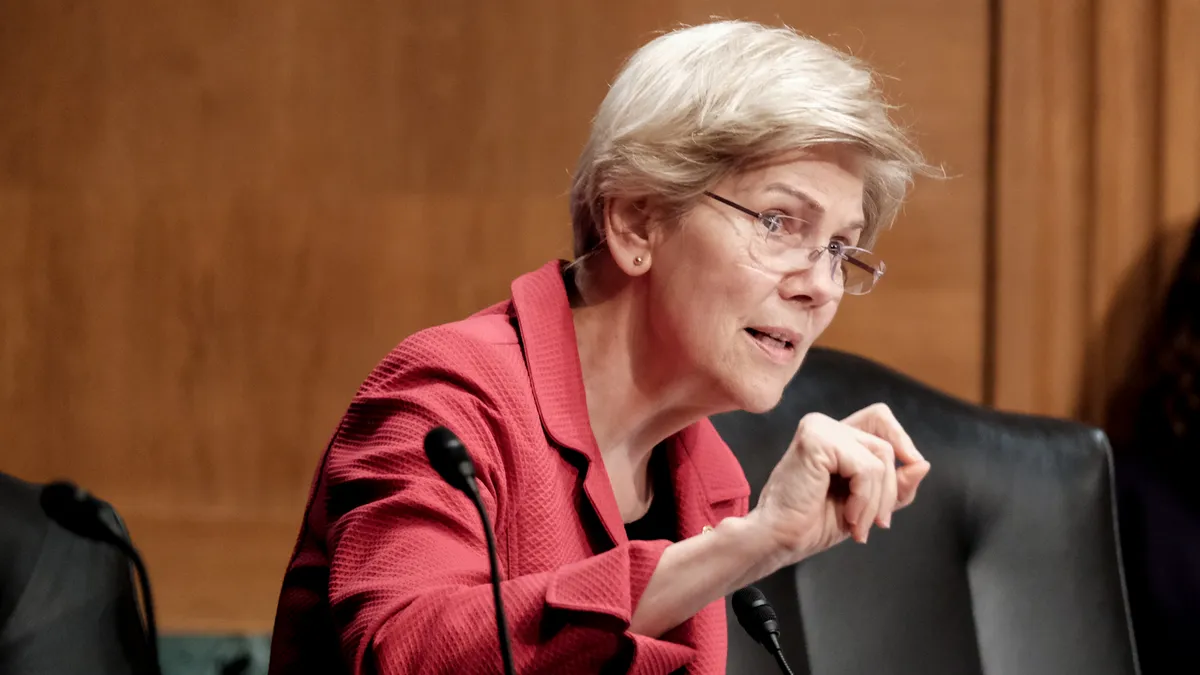Sen. Elizabeth Warren, D-MA, urged Acting Comptroller of the Currency Michael Hsu to impose a growth restriction on Citi, according to a letter seen Thursday by Banking Dive.
Warren cites a January 2023 speech by Hsu, suggesting a “four-step escalation framework” to manage big banks where “control failures, risk management breakdowns, and negative surprises … occur too frequently.”
The steps, Warren said, are: private warnings, public enforcement actions, growth restrictions and, finally, breaking up the repeat-offender bank.
Warren argued the Office of the Comptroller was too lenient with Citi in July, when it and the Federal Reserve imposed $135.6 million in new penalties against the bank for failing to quickly resolve the data quality, risk management and internal control issues that pushed the agencies to issue Citi a pair of consent orders in 2020.
“Your newest enforcement actions against Citi are a mere repeat of the very measures you took in 2020 to try to pressure Citi to change,” Warren wrote Wednesday. “The evidence is clear: Citi has failed to make sufficient progress, despite being provided four years to do so.”
Citi executives have called the transformation of its infrastructure a top priority. The patchwork of systems it inherited through acquisitions in the 1990s and 2000s is largely seen as somewhat responsible for an embarrassing instance in which a bank employee mistakenly and manually transferred $900 million of Citi’s money to creditors of the cosmetics firm Revlon.
Citi, for its part, is considering how it approaches data from an end-to-end point of view, “ensuring that we’re capturing the right critical data elements at inception as they come into our systems so that they are of the quality and the speed with which we need them as we have to do regulatory reporting,” Citi CFO Mark Mason said last month.
“We’ve already done a lot of work at how we invest more in that, how we improve some of those processes, how we strengthen that governance and the standardization around that,” he said.
Mason referred to the new penalties as “feedback.”
Warren, however, said $136 million in additional fines “do not go far enough to hold the bank accountable and sufficiently motivate Citi to reform its systems.”
“According to your own framework, it is clearly time to protect the American financial system by imposing growth restrictions on Citi,” Warren wrote. “If these growth restrictions do not result in the improved management of Citi’s deficiencies, the OCC should consider breaking up this bank.”
The OCC doesn’t comment on congressional correspondence, a spokesperson for the agency told Banking Dive.
If the OCC were to follow through on Warren’s suggestion, Citi would hardly be the only bank to see its growth curbed. The Federal Reserve capped Wells Fargo’s asset total at $1.95 trillion in February 2018 in response to the bank’s 2016 fake-accounts scandal. The central bank has yet to lift that restriction and has given no timeline for doing so.
Warren doesn’t leave the OCC blameless in its oversight of Citi.
“Despite your admission of Citi’s noncompliance … you refuse to take meaningful action to rein in this unruly bank,” Warren wrote Wednesday.














